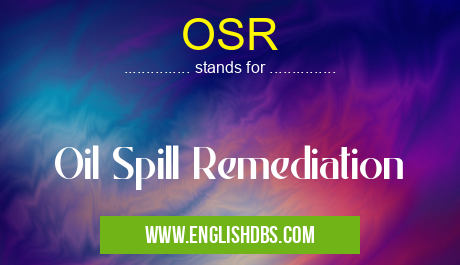What does OSR mean in UNCLASSIFIED
Oil spills can be devastating for the environment and those affected by them. An oil spill, even a minor one, can cause long-term damage to surrounding habitats and ecosystems. The process of oil spill remediation (OSR) is designed to clean up and minimize damages caused by an oil spill. OSR includes activities such as onshore and offshore cleanup, surveillance, containment, disposal, monitoring and evaluation of the effects of the spilled oil on marine species and habitats. Additionally, it involves assessment of ecological damages, protection efforts for endangered species, removal of hazardous materials from beaches and related habitats, and restoration of contaminated areas.

OSR meaning in Unclassified in Miscellaneous
OSR mostly used in an acronym Unclassified in Category Miscellaneous that means Oil Spill Remediation
Shorthand: OSR,
Full Form: Oil Spill Remediation
For more information of "Oil Spill Remediation", see the section below.
What Does OSR Mean?
OSR stands for oil spill remediation. Oil spill remediation refers to a series of activities undertaken to reduce or eliminate harm caused by an oil spill. This includes tasks such as measuring the scope of contamination; addressing immediate safety risks; mitigating environmental impacts; cleaning up impacted sites; restoring wildlife habitats and populations; assessing long-term effects; developing strategies for prevention and response planning; monitoring environmental conditions at impacted sites; communicating progress updates to stakeholders; enforcing legal/regulatory compliance requirements, or implementing other remedial measures necessary under applicable laws.
Essential Questions and Answers on Oil Spill Remediation in "MISCELLANEOUS»UNFILED"
What is oil spill remediation?
Oil spill remediation is the process of cleaning up and restoring contaminated areas caused by oil spills. It involves a variety of practices, techniques, and technologies in order to prevent oil from entering bodies of water or around sensitive ecosystems and to clean up existing contamination.
How can oil spills be prevented?
Properly maintained equipment helps prevent oil spillage. Additionally, regular inspections of fuel tanks for visible leaks, storing oils and chemicals away from storm drains and waterways, regularly testing for leaks in transport vessels, and having emergency response plans can all help lessen the occurrence of an unwanted spill.
What are the most common methods for oil spill remediation?
The two most common types of cleanup methods used for oil spills are mechanical recovery (or physical removal) and chemical treatments. Mechanical recovery typically uses some type of absorbent material such as booms to contain and capture spilled oil on or near the surface. Chemical treatment options include dispersants that break down or disperse the spilled oil into smaller droplets that can then be more easily blended with naturally occurring bacteria that will biodegrade it over time.
Who is responsible for cleaning up an oil spill?
Depending on where the incident occurs, differing levels of government may be involved in responding to an incident. Generally, however, the person or company responsible for the release (i.e., causing) of hazardous materials into a waterway will be subject to legal responsibility for any resulting damage caused by these actions. Cleanup costs associated with these events may also often be paid by this party as well.
How long does it take to clean up an oil spill?
The duration of cleanup depends largely on the size and location of the spill as well as many other factors such as weather conditions and available resources at the time it occurs. A small-scale event with minimal environmental impact could take several days while larger incidents may take weeks or even months before everything has been cleaned up correctly.
What are some possible impacts caused by an oil spill?
Oil spills can have numerous environmental impacts such as damage to marine life (both wildlife populations and habitats), destruction of seagrass beds or coral reefs, reduced air quality due to burning off volatile organic compounds released during cleanup operations, health concerns related to human exposure (direct contact or inhalation ), contamination of groundwater sources if not contained properly, economic losses due to fishery closures during cleanup efforts etc.
Are there penalties associated with causing an oil spill?
Yes - federal regulations outline both civil penalties (such as fines imposed upon polluters who fail to meet certain standards) as well as criminal penalties (if evidence points towards intentional disregard/carelessness). Depending on where the incident occurred these fines may vary significantly from one jurisdiction/region/country to another.
Are there any natural remedies that can help clean up after an incident?
Utilizing naturally occurring bacteria found in water sources like wetlands can be very helpful in breaking down petroleum hydrocarbons present in large amounts during a response effort; however their effectiveness will vary depending on temperature water salinity, concentration levels etc.
Final Words:
Oil spills are complicated situations that require complex solutions in order to mitigate their impact on the environment. OSR is an important part of that response— allocating effort towards preventing further spread of contaminants while also restoring damaged areas to their natural state as much as possible. It is also critical in order to assess how current or predicted future climate change events can affect oil spills so steps can be taken before a disaster occurs rather than after it has already taken its toll. Through rigorous work conducted during oil spill remediation processes we can protect our vital waterways from being irreversibly damaged by hazardous oils.
OSR also stands for: |
|
| All stands for OSR |
